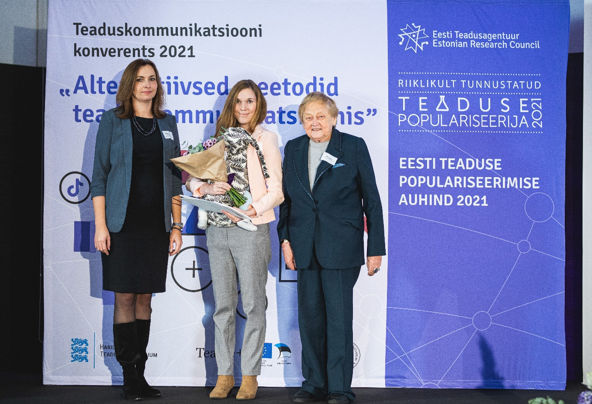News - University of Arkansas
The GLOBE Program in Estonia Receives Prestigious Estonian Science Communication Award

Photo: From Left to Right: Kristi Vinter-Nemvalts, Secretary General, Ministry of Education and Research in Estonia; GLOBE Estonia Country Coordinator Laura Altin and Karl Martin (in baby carrier); and Ene Ergma (Estonia. Academy of Sciences)
In November 2021, The GLOBE Program in Estonia received the Estonian Science Communication Award, in the category “Activities/Series of Activities Communicating Science and Technology.” The aim of the award is to acknowledge, and draw attention to, individuals who promote science in Estonia, as well as boost the activities that introduce science and technology to the general public.
The prize is awarded in cooperation with the Estonian Academy of Sciences. The award is funded by the Ministry of Education and Research. All the awarded/recognized entrants of the contest have the right to use the logo: “Nationally Recognized Science Communicator.”
Estonia joined the GLOBE community in June of 1996. During their 25 years of dedicated involvement with the program, approximately 60 schools have contributed data; and approximately 25 schools are actively involved each year.
“The main supporters and partners of GLOBE activities in Estonia are the Ministry of Education and Research and the U.S. Embassy in Tallinn. The GLOBE network covers the entire country – from small rural schools to urban schools, with everyone participating,” GLOBE Estonia Country Coordinator Laura Altin said.
“The environment around each school is different and, therefore, it is interesting to compare the data and microclimate of different Estonian schools. For example, Muhu Basic School is located on a small island and, therefore, has unique indicators. Miina Härma Gymnasium is located in Tartu, and the air in their region is affected by the nearby railway; and Tartu Kristjan Jaak Peterson Gymnasium is located by a busy road in the middle of a residential area. Such factors affect the measurement results, and GLOBE helps us to notice and understand what affects our daily living environment.”
“From the beginning, Kilingi-Nõmme Gymnasium, which is one of the most successful GLOBE schools in the world, has continuously participated in activities. They have a 24-year continuous data series, so GLOBE schools in other countries, as well as NASA, are interested in collaboration. There is a local boiler house near the Kilingi-Nõmme observation site, and in some cold winters the measurement data also show an increase in black carbon concentration during the heating period,” Altin said.
In addition to receiving the Estonian Science Communication Award, GLOBE Estonia has received five additional awards in 2021:
- “Keskkonnakäpp 2021” (an environmental award, for involving youth);
- “Swedbank Recognition” (“GLOBE 25,” for involving youth in scientific projects);
- “Aasta haridustegu 2021/Act of the Year 2021” (“GLOBE 25” education award; as a national finalist and the primary winner in Tartu); and
- “National Science Communication Award, Second Prize”
“During the 25 years of participating in GLOBE, a large number of students and teachers with different interests have participated in the program. Many former students are now researchers, teachers, scientific journalists, doctors, and lecturers.”
“I am also a GLOBE alumnus,” Laura Altin said. “I joined the program in 1996, when my mother, a geography teacher, took me to the very first teacher training, which took place in the physics building in Tartu. In the first years, we did daily temperature measurements with our class, later also water observations, land cover, and soil measurements. The whole school was involved in GLOBE activities in science and geography lessons. As a student, I participated in a global GLOBE expedition in Croatia in 2003, with a presentation introducing a nature trail connecting GLOBE observation sites around the school. After graduating from school, I started studying geography at the University of Tartu, and continued to participate in GLOBE activities. Most of the people who took an active part in the program have remained involved, and some have pointed out that GLOBE is a lifelong virus.”
News origin: GLOBE Implementation Office




